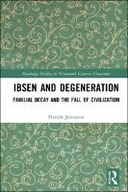Explore

Henrik Ibsen’s plays were written at a critical juncture in late-19th-century European culture. Appearing at a time when notions of evolution and heredity were commonplace themes in literature and the arts, Ibsenian drama highlights the creative potential offered by contemporary evolutionary thought. In his plays, Ibsen explores variations on the theme of degeneration, imagining how families can become affected by ill-health or other forms of “weakness” that lead to the extinction of the family line. Ibsen and Degeneration looks at the recurrence of ideas of degeneration in three of Ibsen’s plays: In Ghosts, it is the motif of syphilis, highly shocking to Ibsen’s contemporaries, which serves as an allegory of degeneration. In Rosmersholm, degeneration is reconfigured as an overcultivation that eventually makes a family unfit for life. In Hedda Gabler, meanwhile, Hedda, having been for all practical purposes raised as a man, has come to think of herself as one, a circumstance which informs her final decision to end her life – her final degeneration. By reading these three plays from a fresh perspective, Ibsen and Degeneration sheds new light on some of Ibsen’s most enduring contributions to world drama.
This book is included in DOAB.
Why read this book? Have your say.
You must be logged in to comment.
Editions

